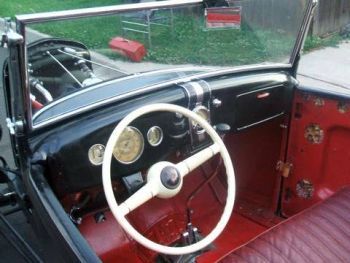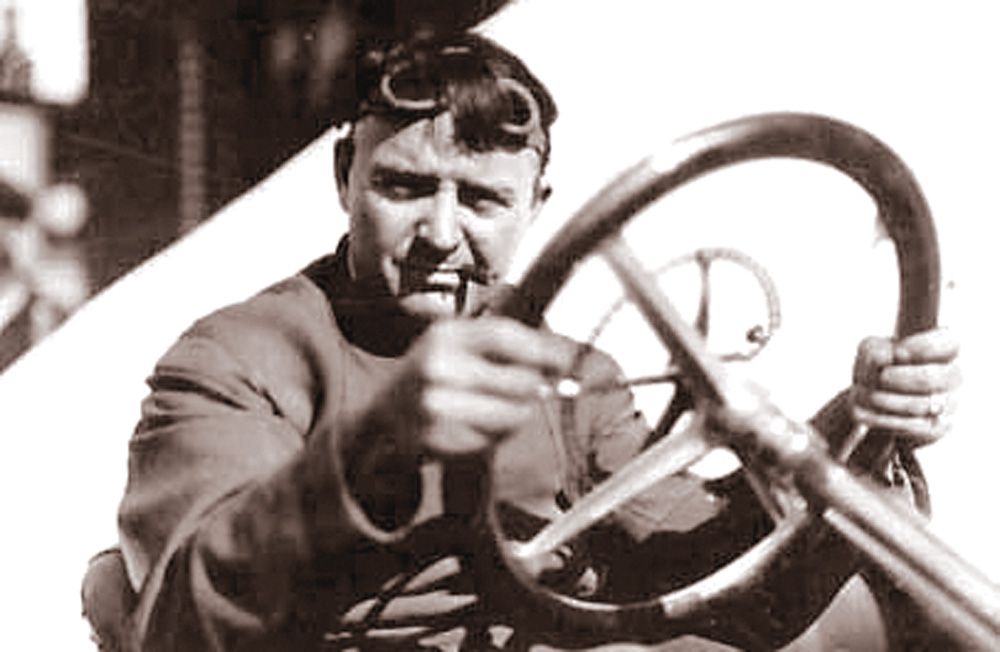
Publisher:
Bonnie King
CONTACT:
Newsroom@Salem-news.com
Advertising:
Adsales@Salem-news.com

~Truth~
~Justice~
~Peace~
TJP
Feb-19-2014 10:12

 TweetFollow @OregonNews
TweetFollow @OregonNews
My Bi-polar Uncle
Bill Annett Salem-News.comMy Uncle Vic was a remarkable man...
 Ford Model A roadster- bringatrailer.com |
(DAYTONA BEACH) - I saw my Uncle Victor on only one occasion, when I was eight or nine years old, and it wasn't a happy event. My brother Jack and I were playing Barney Oldfield in my visiting uncle's Ford Model A roadster, and he, slightly miffed, asked Ross, my father, to eject us. That brief cameo, burned into my mind almost 80 years ago has, colored my view of Uncle Vic for a lifetime.
 Early race car driver Barney Oldfield |
That and the fact that Dad had told us stories of his childhood with his two brothers - Cecil, the elder, and Vic, the kid brother. He, Vic, usually played a role for the two older brothers that could be likened to that miserable younger brother Sid in "The Adventures of Tom Sawyer:" a squeamish little sissy and a bratty infomer. ("Mama, Cecil and Ross are in the cherry tree," and then of course the older two would be thrashed, because climbing the cherry tree was verboten.) And, naturally, as rascally boys on an Ontario farm, they, Cecil and Ross, did much that deserved tattling. Like Mark Twain's Sid, of course, Vic later showed some real worth, some substance, and that's what makes this a story.
Early in the Great War - 100 years ago - Dad tried to enlist in their native Ontario, but was laughed away because of his tender under-age. In default, he and his older brother Cecil ventured west, and in time, perhaps predictably, Victor followed Dad to Alberta and Cecil into a humble vocation as a small town bank teller. And that might have been the end of anything interesting about my Uncle Victor. But it wasn't.
Instead, some time in the Twenties, still a bank teller and with a Grade Nine education, Uncle Vic, with no apparent preamble, decided - and announced - right there in the dry and alien badlands of Southern Alberta - that he was going to become a physician.
The DNA is important in placing this sudden turn of events in perspective. Victor's father, Calvin Randolph, my grandfather, had earlier divorced his wife and abandoned her and his three sons, lighting out for New York City, where he became a millionaire, scaling the heights of the fertilizer industry which, for an Ontario Tory, may not have been too great a reach.
As for Uncle Vic's epiphany, I'll try to be brief. I'm not sure how long it took him to matriculate with a highschool diploma, presumably by correspondence. I do know that by the time the depressed Thirties engulfed Alberta, devastating the lives and families even of men fortunate to hold onto the most menial livelihood, he was enrolled as an undergraduate at the University of Alberta, where he labored at whatever part-time jobs he could find to pay his tuition, books and lodging. It's one thing to "work your way through college" in an affluent society and during a period of prosperity. In Depression Alberta, it must have been well-nigh impossible.
Then he proceeded, I don't know to what extent with scholarships, assistantships or grants, or for all I know still waiting on tables and setting pins in a bowling alley - there were no student loans in those days - to work himself, still in the depths of the Depression, through four years of Medical School, again at the University of Alberta.
Then, without missing a beat, and don't ask me how, he proceeded to the University of Edinburgh, to emerge a Fellow of the Royal College of Surgeons (FRCS), specializing in Internal Medicine. And it was following this, en route to a sinecure of some kind in Victoria, B.C., that Uncle Vic visited my father. Dad was now principal of a small town high school in Alberta, having been to a war and back, having been to Calgary on a business venture and back, and even, perhaps emulating his father, been to pre-Crash Wall Street and back. (Cecil had by now gained some seniority as a bank manager.) And it was then, of course that my brother Jack and I aroused Uncle Vic's ire by playing in his Ford roadster.
In Victoria, he rapidly excelled, not as an internist but in developing a large and affluent practice as a bedside-manner family doctor.
And now for the bitter bit, as the porno verse has it: Uncle Cece had also moved to Victoria, and stories drifted back to us concerning Uncle Vic: he was acting a little strange and reclusive; he had acquired a wife, Ruby, whom the family preferred to view as an unsettling influence. He and Cece were not speaking. Ultimately, in the Forties, Uncle Cece was to find Victor, long since divorced from Ruby, alone and dead in his comfortable Victoria house.
I was only 12 or so; I was not privy to Dad's correspondence with his older brother concerning his younger brother's demise. I have since diagnosed it on the basis of bits and pieces of evidence.
I'm fully convinced that Uncle Vic was a manic depressive; that he spent his middle years in Victoria living well, perhaps until near the end reasonably happy en maison with Ruby, basking in professional success and utterly off his rocker. I also infer that when Cece found him, he had committed suicide, although nobody ever told me that.
Why would I assume that? Because he was crawling with clues. He was like my grandfather, Calvin Randolph, who I know had been as bi-polar as Admiral Perry. Anecdotes about him are not necessary, because I too shared Calvin's and Vic's dysfunctional legacy.
Weep not for the exclusive fraternity of manic depressives. For they on honey dew have fed and drunk the milk of paradise. It was principally before the advent of bi-polar research, medication, therapy and treatment, toward the final quarter of the last Century that most of them ended up dead.
Winston Churchill was one of our boys. So was Ernest Hemingway. The corresponding sisterhood, the ladies' auxiliary, included Patty Duke and Vivien Leigh. Churchill once said or wrote - I can't remember the quote, so I'll paraphrase - that with our ilk, the boundary between monumental achievement and abject failure was as thin as a razor's edge. And his close friend Lord Beaverbrook once noted that the wartime Prime Minister was always either "at the top of the wheel of confidence or at the bottom of an intense depression."
It's been noted that Churchill's manic depressive illness, which he referred to as his personal "black dog," may well have saved his nation during the Battle of Britain. Anthony Storr, both a psychiatrist and an historian wrote:
- "Had he been a stable and equable man, he could never have inspired the nation. In 1940, when all the odds were against Britain, a leader of sober judgment might well have concluded that we were finished."
He might well, as a matter of fact, have negotiated (like Neville Chamberlain) with Hitler, with equally unfortunate results.
Churchill survived his disorder, living to 81. So have my grandfather, the fertilizer magnate, and I . Hemingway blew his brains out in his hunting lodge in Ketchum, Idaho.
As for My Uncle Vic, I'm not really sure. Like I say, it takes one to know one, and he was crawling with clues. But I'm certain of one thing:
My Uncle Vic was a remarkable man...
- So oft it chances in particular men...
From that particular fault.

Bill Annett grew up a writing brat; his father, Ross Annett, at a time when Scott Fitzgerald and P.G. Wodehouse were regular contributors, wrote the longest series of short stories in the Saturday Evening Post's history, with the sole exception of the unsinkable Tugboat Annie.
At 18, Bill's first short story was included in the anthology “Canadian Short Stories.” Alarmed, his father enrolled Bill in law school in Manitoba to ensure his going straight. For a time, it worked, although Bill did an arabesque into an English major, followed, logically, by corporation finance, investment banking and business administration at NYU and the Wharton School. He added G.I. education in the Army's CID at Fort Dix, New Jersey during the Korean altercation.
He also contributed to The American Banker and Venture in New York, INC. in Boston, the International Mining Journal in London, Hong Kong Business, Financial Times and Financial Post in Toronto.
Bill has written six books, including a page-turner on mutual funds, a send-up on the securities industry, three corporate histories and a novel, the latter no doubt inspired by his current occupation in Daytona Beach as a law-abiding beach comber.
You can write to Bill Annett at this address: bilko23@gmail.com
 |
 |
 |
Articles for February 18, 2014 | Articles for February 19, 2014 | Articles for February 20, 2014
Quick Links
DINING
Willamette UniversityGoudy Commons Cafe
Dine on the Queen
Willamette Queen Sternwheeler
MUST SEE SALEM
Oregon Capitol ToursCapitol History Gateway
Willamette River Ride
Willamette Queen Sternwheeler
Historic Home Tours:
Deepwood Museum
The Bush House
Gaiety Hollow Garden
AUCTIONS - APPRAISALS
Auction Masters & AppraisalsCONSTRUCTION SERVICES
Roofing and ContractingSheridan, Ore.
ONLINE SHOPPING
Special Occasion DressesAdvertise with Salem-News
Contact:AdSales@Salem-News.com



Salem-News.com:

Terms of Service | Privacy Policy
All comments and messages are approved by people and self promotional links or unacceptable comments are denied.
[Return to Top]
©2026 Salem-News.com. All opinions expressed in this article are those of the author and do not necessarily reflect those of Salem-News.com.